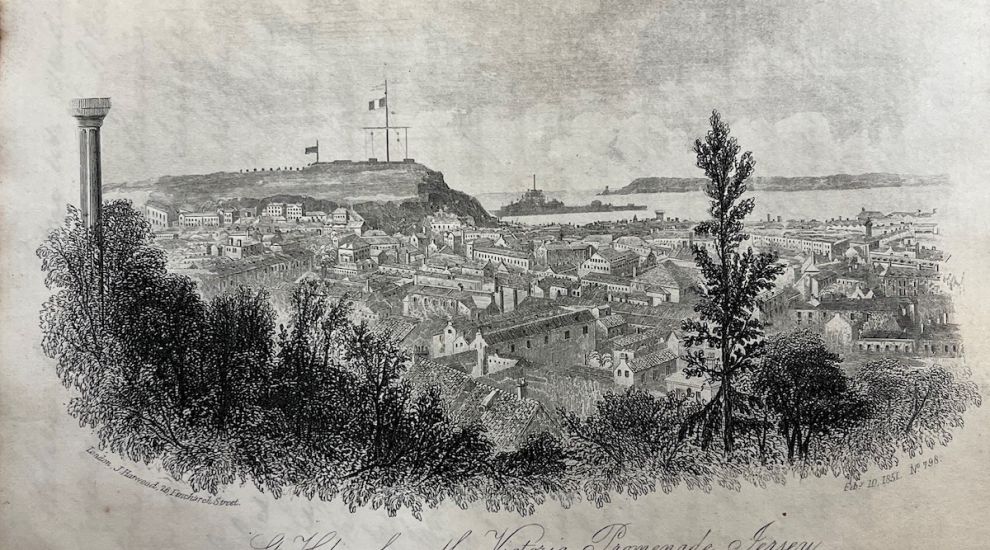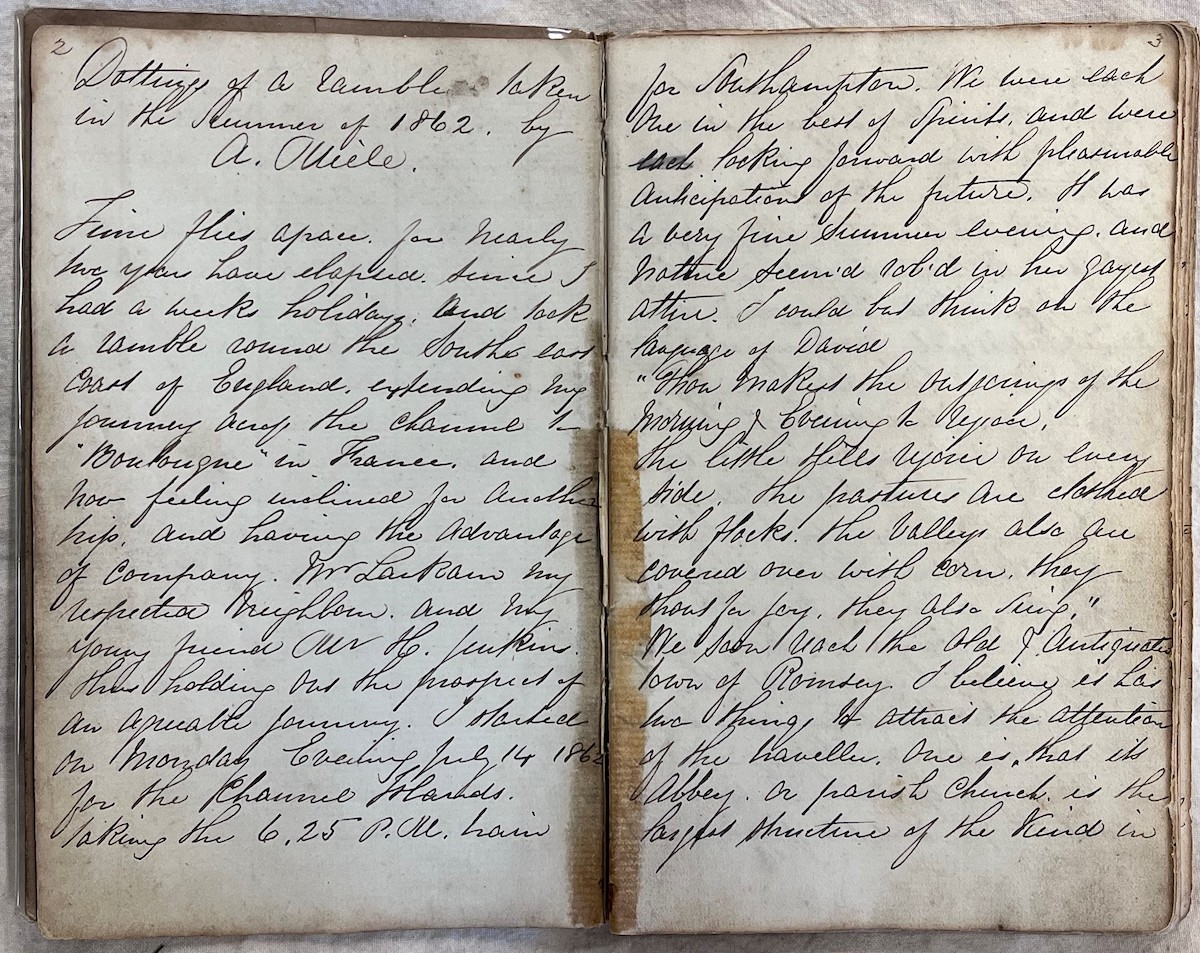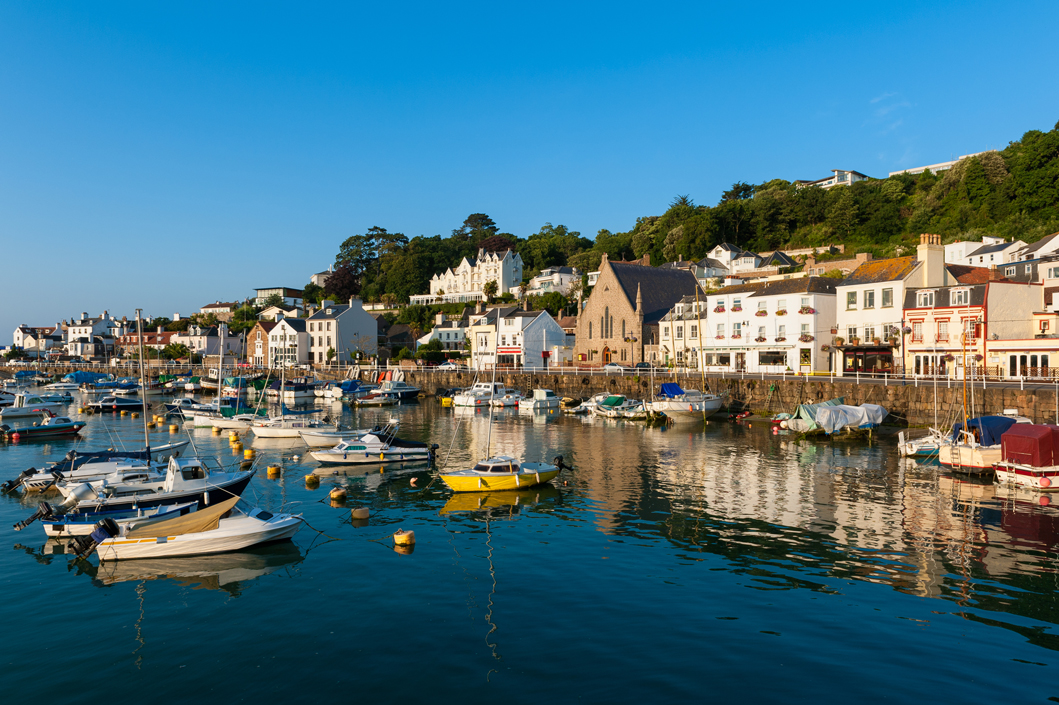


Jersey is often described negatively as a 'tax haven'... But a recently unearthed holiday diary from the 1800s has shown how that status once sparked admiration, with a "well-taxed Englishman" tourist lauding the island as a "blessed country".
'Music Seller' from Salisbury, Alfred Miell, spent a week in Jersey in the summer of 1862 as part of a trip organised by Thomas Cook.
Recently catalogued by Jersey Archive, his journal records a place that seems worlds away - a places where the cows are pretty, the fish is cheap, no one goes hungry and no one has to pay tax.
From poverty to population policy, prominent but mysterious statues and the status of St. Aubin, Express explores his observations about the island in further depth...
He set off from Southampton on Monday 14 July 1862 amidst choppy seas. After a 12-and-a-half hour journey, they landed in St. Helier, and took up their rooms in a boarding house on Bond Street.
Miell certainly made the most of his trip to Jersey and seemed to take in pretty much all the island had to offer. He was quickly taken with the Jersey cow, saying: "Their chief exports are butter, potatoes, cider apples and above all their beautiful cows, for the Jersey, or as they are generally called 'Alderney Cow', is a handsome creature, and much sought after in this country.
"As we pass along, the beautiful Jersey or Alderney Cow cannot but attract attention."
He was also struck by Jersey's particularly polyglot nature at the time, remarking on the presence of English, French and Jèrriais.

Pictured: The diary of Alfred Miell recounts his holiday to Jersey in the summer of 1862.
He said: "A constant babel of tongues is heard on every side. French, English, and many mix up the two languages together a kind of patois, or language of their own."
On finding himself in town, he recorded: "The lower part of the Town is built very irregular, the streets are narrow, the upper part being more modern.
"The streets are mostly built at right angles, but as a whole the town is not built on any regular plan, it seems to have been added to time after time, according to the fancy of the building, or the requirements population."
He continued: "About the centre of the Town is an open space which called the Royal Square... In the centre of this square is a statue but strange to say, the inhabitants themselves cannot agree as to the personage it is supposed to represent."
Having been in place in 1751, the statue is supposed to depict King George II dressed up as a Roman Emperor.
However, as early as 1798 another diarist, William Taylor Morley, recounted that the public had been duped into believing this was George II, and that it was in fact a cheap lead copy of an old figure of Julius Caesar.
Pictured: Then, as now, no one is quite sure who this is supposed to be.
Mr Miell, it seems, had an eye for the particular details. As he wandered around Beresford Street, he found himself in the Fish Market.
He recorded: "I was particularly struck with the cheapness of fish."
He continued: "A large congar eel, weighing perhaps 14 or 15 lbs for 1½s. The mackrell are very fine and grow to a much larger size than those usually sold here as Portland mackrell."
If Mr Miell seemed impressed by the fish prices, that is as nothing compared to his thoughts on Jersey's unique tax situation.
He wrote: "Jersey with about 54,000 inhabitants, and enjoying all the advantages of British protection, is entirely exempt from taxation.
"Only think, no Mr Poovey in Jersey calling upon you, almost every week, and taking away the greater part of the hardworking Englishman income.
"Only think, no poor rates (for they have no poor there), no assessed taxes, no income or property tax, no house or window tax, no stamps, no customs, no excise, no toll gates. Horses, dogs, carriages, servants – all free!"
He concluded: "O! What a blessed country says the well-taxed Englishman.
"...It is pleasing to know that there is at least one spot on God’s earth not blighted with the restrictions imposed upon other highly taxed countries of Europe."

Pictured: "As we pass along, the beautiful Jersey or Alderney Cow cannot but attract attention."
To Mr Miell, it seems, the Jersey of the 1860s was a veritable paradise on Earth: the cows are pretty, the fish is cheap, no one goes hungry and no one has to pay tax.
Mr Miell wrote: "I think I may truly say in all my perambulations I never met with a ragged person, or a common beggar left to take its fair course.
"Population and the means of subsistence have evidently adjusted themselves and the consequence is we see a spectacle of peace and plenty which I’m certain cannot be found in any other part of Europe or perhaps in the whole world."
He also noted down how the islanders of the day felt about their French neighbours.
"I was really astonish’d to find the strong English spirit manifested even by the French inhabitants of Jersey. I could not help laughing one day when speaking a person on this subject.
"'O! Sir' said he. 'We don’t want the French to interfere with us. We like the English much the best.' 'But why?' I asked. Mark his reply: 'Why', said he, 'the English lay out more £5 notes in Jersey than the French would francs.'"
One of the more peculiar anecdotes that Mr Miell absorbed during his time, concerned the town of St Aubin. Upon his visit, he was particularly struck by the place.
"It is still call’d a town but it is in reality no more than village, but one of the prettiest ever I saw."
However, he soon stumbled upon a curious tale which sought to explain why St. Aubin never developed into Jersey's principal town.

Pictured: According to Alfred Miell, St. Aubin declined in importance after its inhabitants threw eggs and turnips at the Methodist preacher Adam Clarke.
It all began in the late 1700s when a Methodist preacher, Adam Clarke, set up a mission in St. Aubin.
Soon after he was "rudely cheated" and "driven from the town" by a "lawless mob". He tried to reason with them, but "filthy missiles were thrown at him, rotten eggs, turnips, and even stones."
This did not deter him. Mr Miell writes: "The next Sabbath arrived, and Adam Clarke took his stand on the brow of the hill overlooking the town. But the inhabitants came out with drums, bells, rattles, horns making every kind of noise and completely drowning the preachers voice.
"Adam Clarke was now in despair. They drove him down the hill, but when he got to the bottom of the town, he turn’d round and addressing his persecutions, said I came to preach the gospel to you. You have refused to hear it. I shall now do as my master hath bid me. The taking out an handkerchief he wiped off [sic] the dust from the soles of his boots sating “this dust I wipe off as a testimony against the inhabitants of St Aubins”.
"And strange to relate, but not more strange than true, St Aubins have declined in importance ever since."
Upon ending his trip and returning to England, Mr Mielle wrote in his diary: "But surely I can say I never enjoy’d myself better in my life.
"Nothing that I can say can in any way over rate the beauties of this Island. Surely it is in every respect 'The Gem of the Ocean'."
With thanks to Jersey Archive - who accessioned, transcribed and catalogued the diary - and their help in putting together this article. Explore more Jersey Archive collections by visiting their website HERE.
Pictured top: 'St Helier from the Victoria Promenade' by J Harwood, 1851.
Comments
Comments on this story express the views of the commentator only, not Bailiwick Publishing. We are unable to guarantee the accuracy of any of those comments.